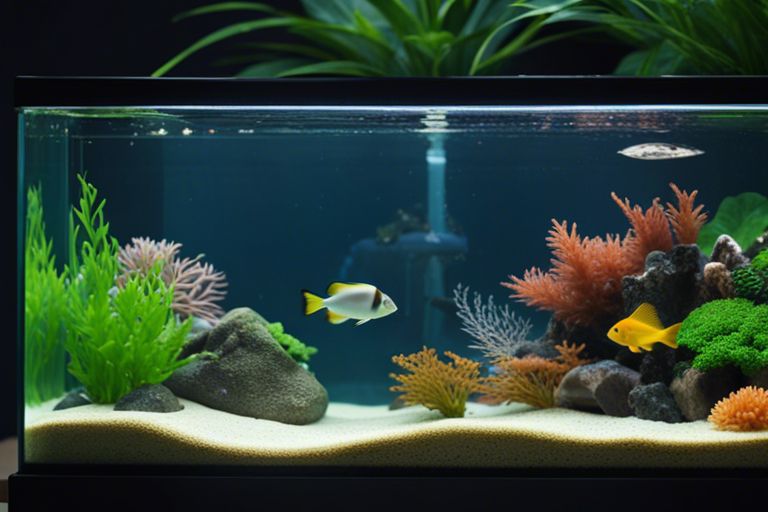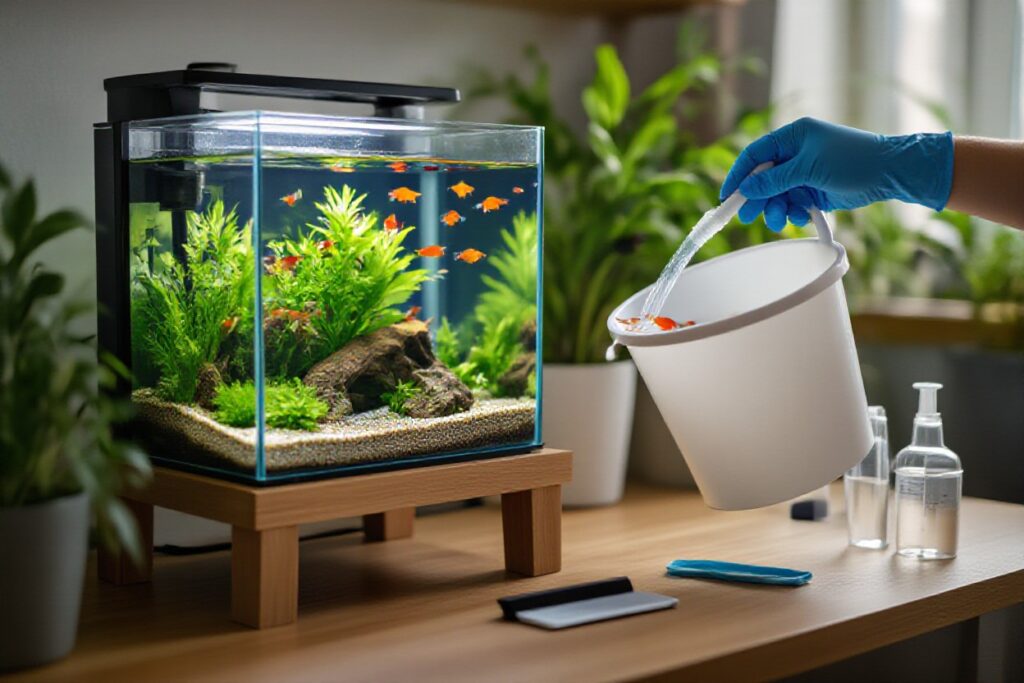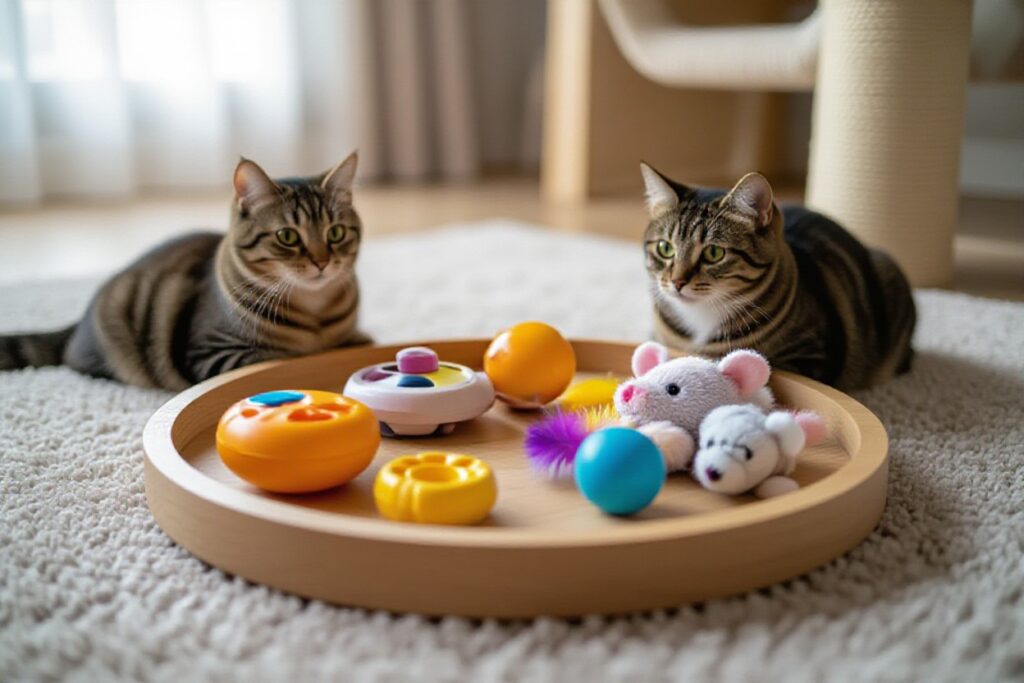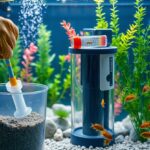You love your fish, and maintaining their health is crucial to ensuring they thrive in their aquatic environment. Whether you’re a beginner or seasoned fish keeper, ensuring your fish are healthy should be a top priority. You may ask, “How do I keep my finned friends happy and healthy?” In this article, we’ll probe into the top 10 crucial tips for maintaining your fish’s health, covering everything from water quality to proper nutrition and more.
Balanced Diet
Varied nutrition
Your fish’s health relies on a varied diet to ensure they receive all the important nutrients they need. Offering a mix of high-quality flakes, pellets, frozen, and live foods can help prevent nutritional deficiencies and promote overall wellbeing.
Appropriate portions
To maintain your fish’s health, it’s crucial to feed them appropriate portions. Some species are prone to overeating, which can lead to obesity and other health issues. Consult with your vet or do research to determine the right amount to feed your fish based on their species and size.
Appropriate portions not only prevent overeating but also help maintain water quality in your aquarium. Uneaten food can quickly break down and create harmful byproducts, impacting the overall health of your fish and other tank inhabitants.
Clean Water
Regular changes
For a healthy aquatic environment, regular water changes are crucial. Aim to replace about 10-20% of the water in your fish tank every 1-2 weeks. This helps remove any built-up toxins and maintains a stable water quality for your fish.
Adequate filtration
Even with regular water changes, a good filtration system is necessary to keep the water clean and free of debris. Choose a filter that is appropriate for the size of your tank and the type of fish you have. Make sure to clean or replace filter media regularly to prevent buildup of harmful substances.
A filtration system includes mechanical, biological, and chemical filtration. Mechanical filtration removes physical debris from the water, biological filtration breaks down harmful ammonia and nitrites into less toxic nitrates, and chemical filtration can help remove impurities like excess nutrients or medications.
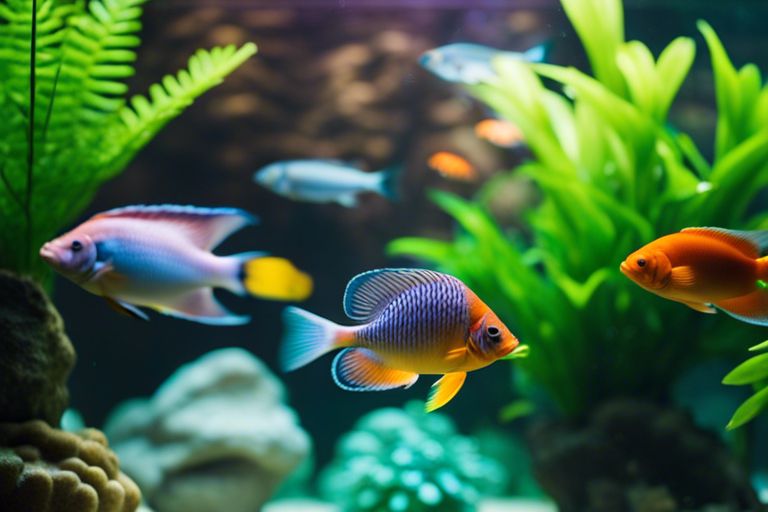
Proper Tank Size
Space for growth
If you want your fish to live a healthy and happy life, providing them with enough space to grow is vital. Fish, like any other living creature, need room to move around, explore, and exercise. Choose a tank size that will accommodate your fish’s adult size, considering their species-specific requirements for swimming space. Giving them ample room will help reduce stress and promote overall well-being.
Avoid overcrowding
Even though it might be tempting to fill your tank with numerous colorful fish, overcrowding can lead to serious health issues. When there are too many fish in a confined space, the water quality can quickly deteriorate due to excess waste production. This puts stress on the fish and makes them more susceptible to diseases. It’s best to follow guidelines for the number of fish based on their adult size and ensure they have enough room to establish territories and swim freely.
Any signs of overcrowding, such as aggressive behavior, increased waste buildup, or stressed fish, should be addressed immediately by either removing some fish or upgrading to a larger tank. Bear in mind, maintaining a healthy environment for your fish starts with providing them with the right amount of space to thrive.
Suitable Tank Mates
After selecting the perfect fish for your aquarium, it is crucial to consider the compatibility of tank mates to ensure a harmonious environment. Even the most beautiful fish can become stressed or aggressive if their tank mates are not well-suited to cohabitate with them.
Compatible Species
One crucial tip for maintaining your fish’s health is to research and select compatible species that thrive in the same water conditions and have similar temperaments. Some fish species are known to be more aggressive and territorial, while others are peaceful and prefer to school. It is important to choose tank mates that will not outcompete or harm your fish.
Stress reduction
Suitable tank mates can play a significant role in reducing stress for your fish. Stress is a leading factor in fish illness and can weaken their immune system, making them more susceptible to diseases. By selecting peaceful tank mates that create a calm and stress-free environment, you can help promote your fish’s overall well-being and longevity.
Regular Health Checks
Observe behavior
To ensure your fish’s health, regular observation of their behavior is crucial. Assuming you are familiar with your fish’s normal behavior, any sudden changes such as increased lethargy, loss of appetite, or unusual swimming patterns could indicate a health issue. Keep an eye out for any unusual behavior and address it promptly to prevent potential health problems.
Inspect for diseases
Some common signs of diseases in fish include changes in skin coloration, abnormal growths, or fin deterioration. A thorough visual inspection of your fish can help you detect early signs of diseases. A magnifying glass can be helpful in spotting tiny parasites or abnormalities that may not be visible to the naked eye. Conduct regular checks to ensure your fish are healthy and thriving in their environment.
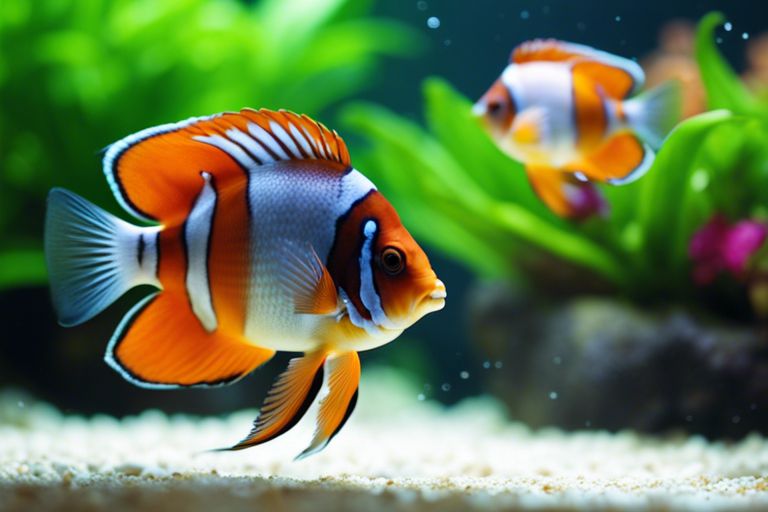
Stress Minimization
Stable environment
For a healthy fish, maintaining a stable environment is crucial. Sudden changes in water temperature, pH levels, or ammonia levels can stress out your fish. Invest in a high-quality water thermometer to monitor the water temperature regularly. Use a reliable water testing kit to check pH and ammonia levels and make sure to maintain them within the recommended range. Consistency is key to keeping your fish happy and stress-free.
Hiding places
For many fish species, having hiding places in the aquarium is imperative for reducing stress. Rocks, plants, or commercial caves can provide shelter for your fish when they feel threatened or overwhelmed. You can also consider adding floating plants to create shaded areas where fish can retreat. These hiding places mimic their natural habitat, giving them a sense of security and reducing stress levels.
You can further enhance the hiding places by arranging them strategically around the aquarium. Create multiple hiding spots at different levels to accommodate the diverse needs of your fish. Providing a variety of hiding places will help ensure that all your fish have access to safe spaces where they can retreat whenever they feel the need.
Maintain Water Quality
Monitor Parameters
The key to maintaining a healthy environment for your fish is to consistently monitor the water parameters. This includes checking the temperature, ammonia levels, nitrite levels, and nitrate levels regularly. Use a reliable water testing kit to ensure that the levels are within the acceptable range for your fish species.
pH and Hardness
With proper pH and hardness levels, you can create a stable environment for your fish. pH measures the acidity or alkalinity of the water, while hardness refers to the mineral content. It is imperative to keep these levels stable as fluctuations can stress your fish and compromise their immune system.
It is recommended to test the pH and hardness of your water regularly and make adjustments as needed. Most fish species thrive in a pH range of 6.5 to 7.5, but it’s crucial to research the specific requirements of your fish to ensure their well-being. You can use products like pH buffers or mineral additives to maintain the optimal levels for your aquatic pets.
Avoid Overfeeding
Follow feeding schedule
All fish owners should be aware of the importance of following a consistent feeding schedule. Overfeeding can lead to poor water quality, algae growth, and unhealthy fish. It is crucial to only feed your fish the amount they can consume in a few minutes and stick to a regular feeding routine. This will help maintain a balanced ecosystem within your aquarium and keep your fish healthy and happy.
Watch for obesity
Overfeeding your fish can result in obesity, which is a common issue in aquarium fish. You must be vigilant and observe your fish for any signs of overweight. Obesity can lead to various health problems such as swim bladder disease, fatty liver, and even shortened lifespan. You should adjust the feeding amount accordingly and provide a balanced diet to prevent obesity in your fish.
You should monitor your fish’s body shape regularly and consult with a vet or experienced aquarist if you notice any abnormal weight gain. Additionally, consider incorporating more live or frozen foods into their diet rather than just dry pellets to prevent obesity and ensure proper nutrition for your fish.
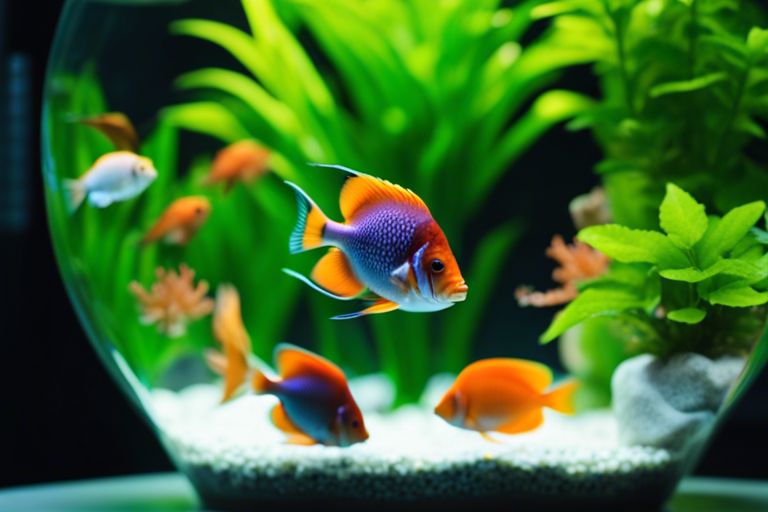
Quarantine New Arrivals
Prevent disease spread
Keep your fish healthy by implementing a quarantine process for all new arrivals. Before introducing them to your main tank, isolate them in a separate tank for a few weeks. This precaution will help prevent potential diseases from spreading to your existing fish population.
Observation period
You’ll want to observe the new fish closely during the quarantine period. Look for any signs of illness such as abnormal behavior, loss of appetite, or physical abnormalities. If any issues arise, you can address them promptly without putting your other fish at risk.
On top of monitoring for signs of diseases, use this observation period to acclimate the new fish to their new environment. Ensure they are eating well, swimming normally, and interacting positively with their surroundings. This period also allows the fish to de-stress from transportation and adjust to the water parameters of your tank.
This quarantine process may seem tedious, but it is imperative in ensuring the health and well-being of your entire aquatic community. By being vigilant and proactive, you can prevent potential outbreaks and keep your fish happy and thriving in the long run.
Educate Yourself
Research species needs
Not all fish species have the same requirements when it comes to their care and well-being. It is crucial to thoroughly research the specific needs of the fish you are keeping to provide them with the proper environment, diet, and social conditions for optimal health.
Stay informed
Stay updated on the latest advancements in the field of aquatic medicine and fish husbandry. Knowledge about new diseases, treatment methods, and dietary recommendations can help you provide the best possible care for your fish and prevent potential health issues.
With the vast amount of information available online, you can join fish forums, subscribe to reputable fishkeeping magazines, and follow expert blogs and websites to stay informed about the latest trends and developments in fish health and care. Attending workshops, seminars, and conferences can also help expand your knowledge and skills in fishkeeping.
Summing up
Conclusively, maintaining your fish’s health requires a combination of proper feeding, regular tank cleaning, and careful observation of their behavior. By following the crucial tips outlined in this guide, such as monitoring water quality, providing a balanced diet, and ensuring a suitable tank environment, you can help ensure your fish stay happy and healthy for years to come. Recall, prevention is key when it comes to fish health, so staying proactive and attentive to your fish’s needs is crucial for their well-being. By incorporating these tips into your routine, you can enjoy a thriving aquarium full of vibrant and flourishing fish.
FAQ
Q: Why is maintaining a fish’s health important?
A: Maintaining a fish’s health is crucial to ensure they live a long and happy life in your aquarium. Healthy fish are more vibrant, active, and less prone to diseases.
Q: What are some signs that indicate a fish is unhealthy?
A: Signs of an unhealthy fish include loss of appetite, lethargy, abnormal swimming patterns, faded colors, fin rot, and visible parasites.
Q: How often should I clean my fish tank?
A: It is recommended to clean your fish tank at least once a week. Regular water changes and debris removal will help maintain a healthy environment for your fish.
Q: What is the importance of water quality in fish health?
A: Water quality is important for fish health as it affects their overall well-being. Proper pH levels, temperature, and ammonia levels are crucial for the health of your fish.
Q: How can I ensure my fish are receiving proper nutrition?
A: Providing a varied diet that includes high-quality fish food, live or frozen foods, and supplements will help ensure your fish are receiving the necessary nutrients for good health.
Q: Should I quarantine new fish before adding them to my aquarium?
A: Yes, it is highly recommended to quarantine new fish for at least 2 weeks before adding them to your main tank. This helps prevent the spread of diseases to your existing fish population.
Q: What is the importance of monitoring fish behavior?
A: Monitoring fish behavior is important as changes in behavior can indicate underlying health issues. Pay attention to how your fish eat, swim, and interact with each other on a daily basis.
